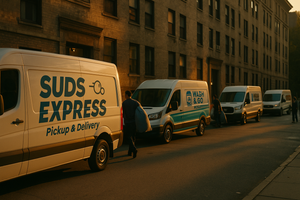I've been watching something that has been taking place for many months now. And it has me concerned.
Every couple weeks, I'll notice a new residential pickup and delivery company in one of my social media feeds advertising their services or announcing their launch. Some of them are running crowdfunding campaigns. The pitch is always the same. Low startup costs, recurring revenue, huge market opportunity.
Here's my take, and it won't be inline with the popular talk of laundry PUD.
I'm bearish on the pickup and delivery market as a whole right now because of the saturation happening right now. This isn't about any particular business model. It's about how many players the market can actually support.
Let me show you what I mean.
Success Takes More Than Most Have
Saichelle McNeill started The WashRoom in Charlotte back in 2016. 100% mobile pickup and delivery. No laundromat. No physical storefront. Just smart execution.¹
She brought Six Sigma principles to her business and applied them. Twelve years of manufacturing operations experience. Expertise in Lean and Kaizen. She added full integrated POS systems, documented processes, created strategic partnerships with local processors.
It worked. The WashRoom is still running today and growing. She now has her own facility.
Her success shows what's possible with the right execution. But it also shows what most operators are up against.
Ghost Kitchens Had Better Odds
Between 2018 and 2021, ghost kitchens looked unstoppable.
CloudKitchens raised $850 million.² Reef raised $700 million.³ Dozens of companies raised hundreds of millions more. The pitch was simple. Food delivery is exploding. We just need kitchen space to meet demand.
Think about what they had going for them.
People already ordered takeout. DoorDash and Uber Eats had spent billions training consumers. The behavior change was done. Ghost kitchens just had to capitalize on existing demand.
They had 5-7 years and billions in capital.
By 2024, most were dead.
CloudKitchens laid off 15% of staff and closed locations.⁴ Reef pivoted away from ghost kitchens entirely.⁵ Kitchen United shut down. Wonder bought Grubhub at a 91% discount just to survive.⁶
If ghost kitchens with those advantages couldn't make it work, what does that tell us about laundry?
The Behavior Change Problem Nobody Talks About
Ghost kitchens didn't have to change consumer behavior.
People already ordered food delivery 2-3 times per week. The apps just made it more convenient.
Laundry outsourcing requires breaking generational habits. Research shows simple habit formation takes 66 days on average. Complex behavior changes can take up to 254 days.⁷
We're asking people to outsource something they've done themselves their entire lives. Something their parents did. Something that feels like a basic life skill.
Food delivery happens multiple times per week. Laundry? Once weekly at most, often bi-weekly. Lower frequency means higher customer acquisition costs spread across fewer transactions.
And here's the kicker. The infrastructure already exists. Most apartments have laundry. Most neighborhoods have laundromats. We're not solving a convenience problem like food delivery did.
We're asking people to pay more for something they can already do cheaply.
What I'm Seeing Right Now
I've been tracking laundry PUD activity across several crowdfunding platforms and social media. Here's what's happening.
Loopie ran a Wefunder campaign in 2024. Raised $388,710 from 170 investors.⁸ The website now redirects to a hotel. Campaign closed. No updates to investors explaining what happened.
Laundry Hero launched their Wefunder campaign with promises of growth. Their investor question page tells a different story.⁹
"Convince me this is NOT a SCAM."
"What's your revenue for 2023, 2024?"
"Your website doesn't exist."
"Do you think you'll be out of business in 12-24 months?"
Months of questions. Zero responses from the company. The campaign? Still shows "Raising Now."
This isn't new history. Washio raised $17 million in 2016 and shut down completely.¹⁰ FlyCleaners struggled for years before Rinse acquired them in 2022.¹¹ Cleanly faded during COVID.¹²
Even the rare success stories tell you how hard this is. Rinse took 12 years and over $70 million in funding to build a sustainable business.¹³ That's not venture capital returns. That's patient capital building infrastructure one market at a time.
What's Really Happening
Here's what concerns me most.
The market is expanding from every direction simultaneously.
Existing laundromats are adding PUD. American Coin-Op documented hundreds of traditional operators launching pickup and delivery in 2023-2024.¹⁴ They already own equipment, have space, understand the business, and have local presence.
PUD-only startups are entering across several crowdfunding platforms and social media. Low barrier to entry. A vehicle, some software, marketing budget.
Marketplace platforms are scaling. Poplin, SudShare, HamperApp.¹⁵ They connect customers to providers.
Let’s do some example math. If 29,000 laundromats exist nationally and 20% add PUD, that's 5,800 PUD operators. Add hundreds of PUD-only startups. Add multiple marketplace platforms.
Research shows only 22% of households use laundry services.¹⁶ The market isn't growing fast enough to support this many players.
Thinking about the thinking of laundry:
When many are jumping on PUD, ask, what does this market actually support before someone has to lose?
It's Not About the Model
This isn't about which business model wins.
Each model has different success rates based on how operators approach the market, create clients, and hold onto them.
Brick-and-mortar operators adding PUD have advantages. Equipment costs are covered. Google search favors physical locations. Self-service revenue cushions PUD development. They can convert established drop-off customers.¹⁷
PUD-only operators can succeed if they have what Saichelle brought. Operational discipline. Realistic capital. We're talking $40-80K minimum.¹⁸ Strategic partnerships rather than trying to own everything.
Platform businesses face the hardest challenge. They have to prevent provider churn, maintain quality control without owning operations, and justify their cut in a market where direct relationships always win.
One of their challenges is they're acquiring a customer but outsourcing the work. The people they outsource their work to could have the customer's information in some cases, and end up building a direct relationship with them, which then would cut out the platform.
The winners won't be determined by their business model. They'll be determined by execution. Real brands. Real relationships. Real cost control. Real artist.
What This Means for You
I'm not saying don't do PUD.
I'm saying be aware of what's coming.
The market can only support so many players before consolidation forces the question, why should clients choose you?
Build defensively to keep your current clients. Build offensively to keep acquiring new ones. Focus on what actually drives retention. Service quality. Convenience. Trust. Consistent execution.
When everyone's rushing into a market, that's exactly when you should pause and ask whether it makes sense for you.
That's all I got for you today.
Waleed
P.S.: Building something for laundry entrepreneurs who want real discussions without the noise. Early access: www.joinpressed.com
Echoing the thoughts of Peter Lynch.
Go for a business that any idiot can run - because sooner or later, any idiot probably is going to run it.
Footnotes:
¹ Saichelle McNeill LinkedIn and The WashRoom
² CloudKitchens raises $850 million - CNBC, 2021
³ Reef raises $700 million - TechCrunch, 2021
⁴ CloudKitchens layoffs - Restaurant Business, 2024
⁵ Reef pivots away from ghost kitchens - The Information, 2024
⁶ Wonder acquires Grubhub - Bloomberg, 2024
⁷ Habit formation research - European Journal of Social Psychology, 2010
⁸ Loopie Wefunder campaign page - campaign closed after raising $388,710 from 170 members, website now redirects
⁹ Laundry Hero Wefunder investor questions page - campaign still showing "Raising Now" with months of unanswered investor questions
¹⁰ Washio shuts down - TechCrunch, 2016
¹¹ Rinse acquires FlyCleaners - Planet Laundry, 2022
¹² Cleanly merges - American Coin-Op, 2020
¹³ Rinse funding and growth - TechCrunch, 2025
¹⁴ Incorporating PUD series - American Coin-Op, 2023-2024
¹⁵ Platform research from Poplin, SudShare, HamperApp websites and app stores
¹⁶ Laundry service usage - Swash Survey, 2022
¹⁷ Operator interviews - Planet Laundry features on Joe Dan Reed (Splash 'Em Out), Matt Simmons (Curbside Laundries), Paul Hansen
¹⁸ Capital requirements analysis - Planet Laundry operator research and interviews, 2023-2024





